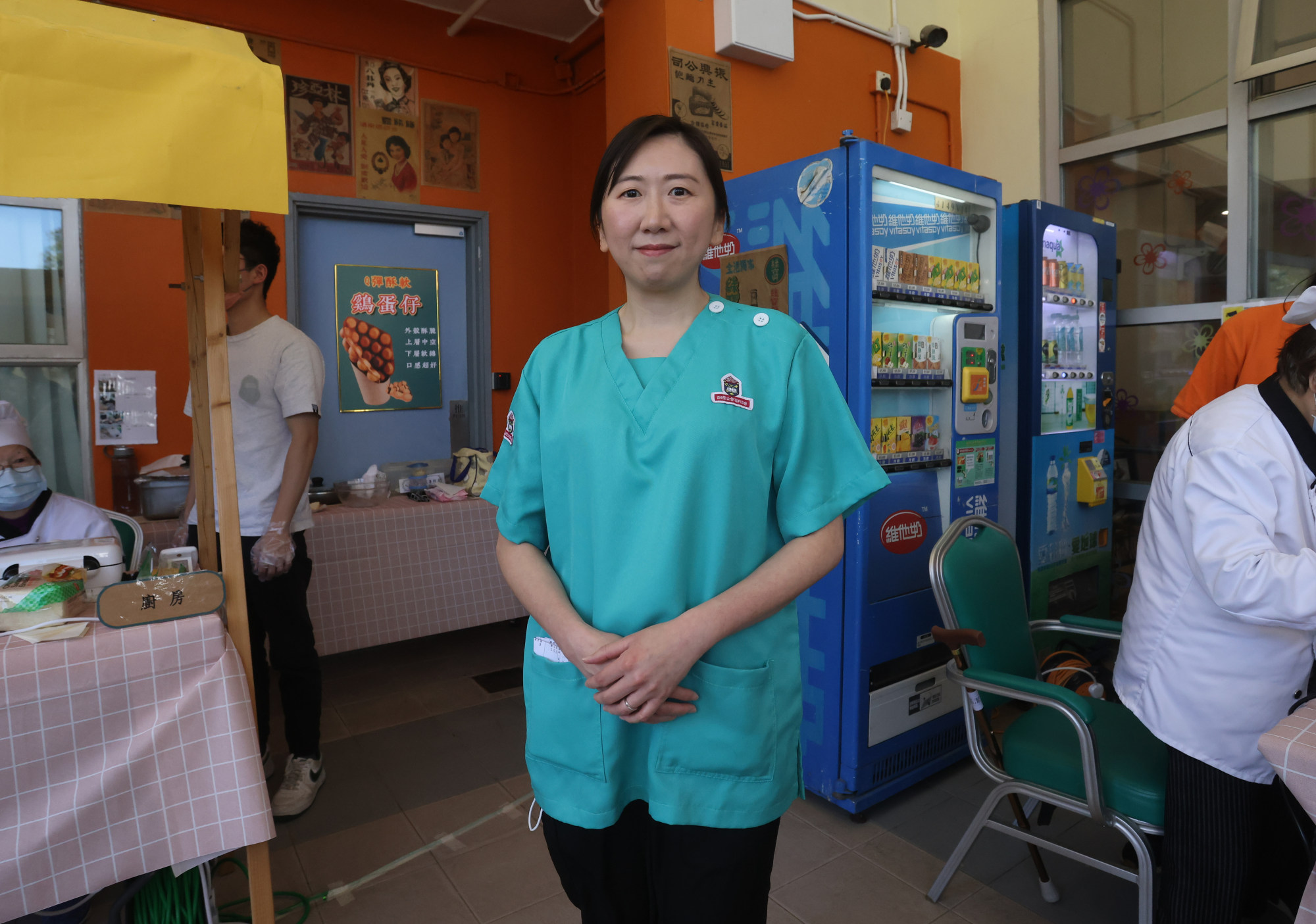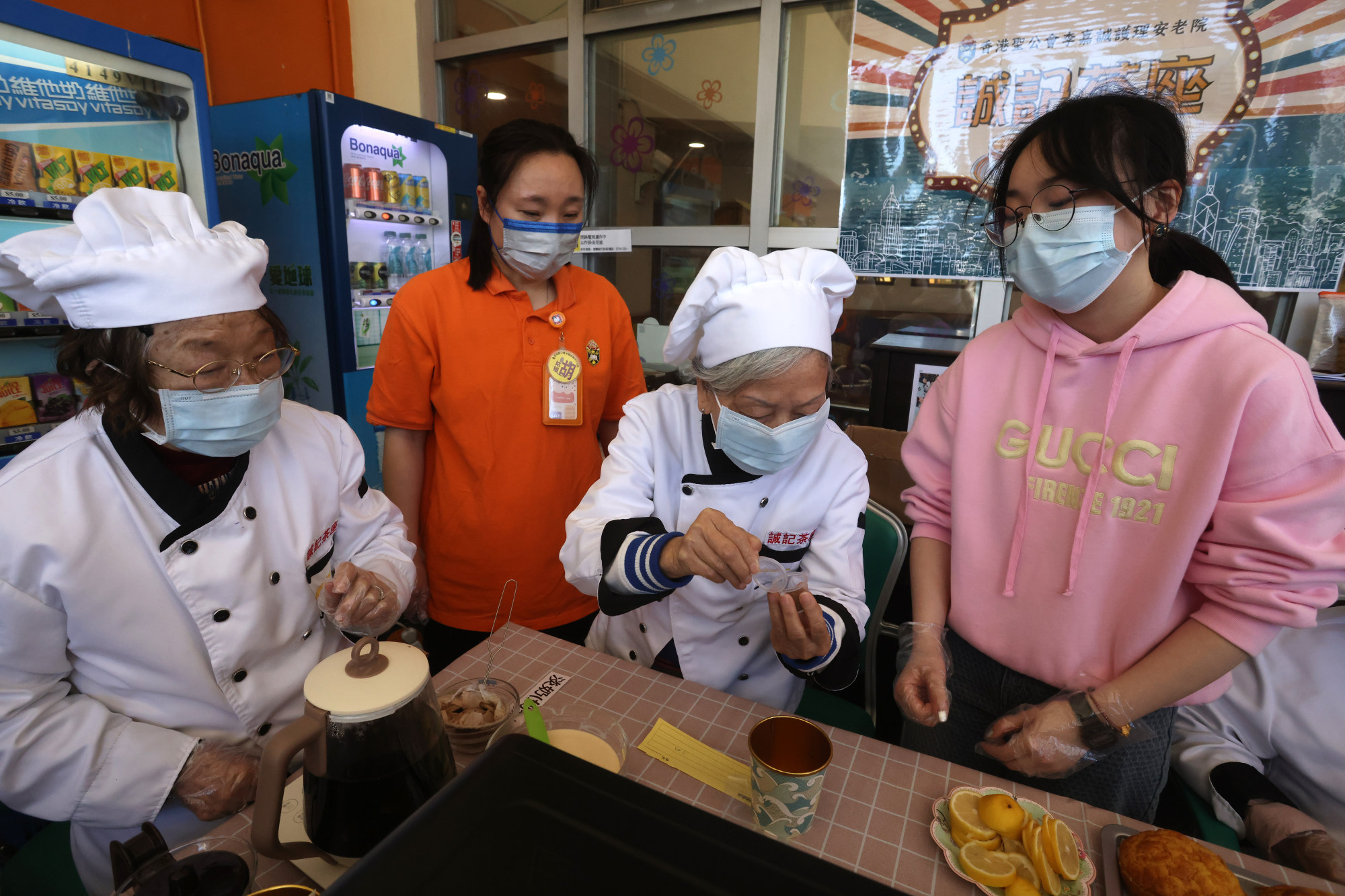
Cafe role-play helps to bring back memories for elderly Hong Kong care home residents with dementia
- H.K.S.K.H. Li Ka Shing Care and Attention Home for the Elderly in Shek Kip Mei launched first-of-its-kind cognitive training project on Tuesday
- Residents take orders, cook food and serve customers, with occupational therapist behind programme saying she was inspired by Japan’s memory cafes
The tempting aroma of warm pineapple buns wafts through the air as attentive waiters in crisp white uniforms serve Hong Kong-style milk tea ordered from vintage menus – welcome to Shing Kee Cafe, a food spot with a difference.
The cafe is on the porch of a Hong Kong care home and its elderly staff all have dementia.
H.K.S.K.H. Li Ka Shing Care and Attention Home for the Elderly in Shek Kip Mei launched the first-of-its-kind cognitive training project on Tuesday to support its elderly residents with dementia.

In 2017, 100,000 elderly residents above the age of 60 had dementia in Hong Kong, with authorities estimating the figure could pass 300,000 in 2039 amid the city’s fast-greying population.
Research by the Chinese University of Hong Kong in 2021 found the prevalence rate of dementia to be 5 per cent for people aged 60 and above, and as high as 47.5 per cent for those aged 85 and above.
Shing Kee Cafe, which has three tables, is only open to care home residents for the time being.
As care home workers slowly wheeled residents to the porch, eight cafe “staff” rolled up their sleeves to welcome their first batch of patrons.
Hong Kong police to provide more tracking devices to dementia patients, carers
Two residents played the role of waiters to take orders, while the rest were busy making toast and sandwiches, reheating pineapple buns and curry fishballs and brewing drinks from two kiosks with the help of student volunteers or care home staff.
After finishing their food, patrons paid the “boss” – another resident – at a small counter with game coins.
Occupational therapist Yancy Chu Mung-yan, who is in charge of the programme, said she was inspired by Japan’s memory cafes, operated by elderly dementia sufferers, and started preparations in December.

“Compared with our regular cognitive training, this is more engaging for both patrons and staff because it is a group activity, allowing them to interact and communicate with each other,” she said.
“Cha chaan teng [Hong Kong-style cafes] can easily strike a chord in their hearts and evoke memories because they used to visit these restaurants a lot.”
Chu said they selected residents who had experience in making food, including housewives or those who worked in the catering industry, and conducted simple training and trials beforehand.
To ensure they could handle the work, smaller kettles were chosen, and each resident was paired with one staff member or a volunteer to help them.

“Many elderly residents showed signs of social withdrawal after the pandemic because they were too scared of getting infected, so it took some time for us to encourage them to join this activity,” Chu said.
She said the short-term memory, attention and communication ability of those joining the activity had significantly improved compared with the early stages of training.
“Dementia impairs one’s speech, affecting vocabulary, response and talking speed, but the activity encourages them to speak more because they need to work with each other at the booths.”
Why more Hong Kong retirees are homing in on Greater Bay Area
The care home will hold the activity once or twice a month with a different menu every time. Each session lasts about two hours.
Chu said the home was exploring the possibility of turning the programme into a real business in the long run, opening Shing Kee Cafe to residents’ families.
Leung Kam-chiu, a 79-year-old resident, spent the afternoon taking orders. The retired nurse said he felt satisfied to serve people again.
“This is easy for me, I could take some harder challenges next time,” he said.
Wong Shui-ying, 93, one of the oldest cafe workers, was in charge of making toast.
The former owner of a dai pai dong – a street food stall – also helped to design the menus and workflows at the booths.
“She was getting in bad moods after being discharged from hospital earlier, and needed to use a walking frame,” said her 72-year-old daughter Mandy Lau.
“But now she is very happy to make food again, despite being very slow. She would even show us how to cut the butter and make tuna paste nicely.”

